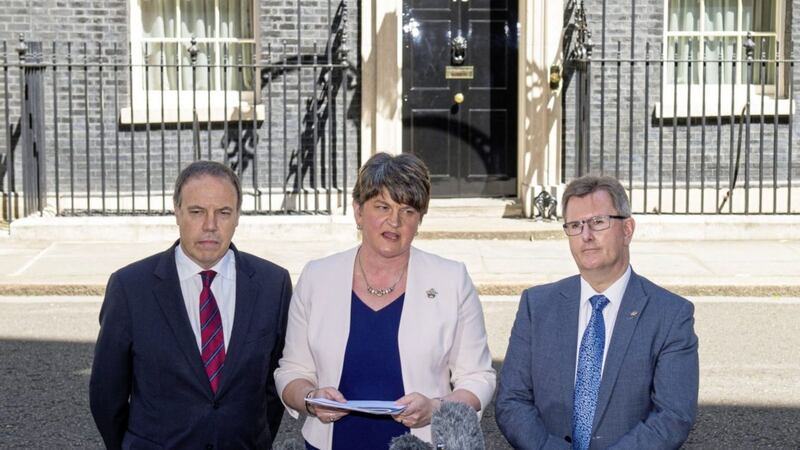In political terms, yesterday's Anglo-Ulster Agreement (what else can we call it?) represented good news for the DUP, possibly offered some short-term respite for social and economic problems here and, perhaps most significantly, left Sinn Féin between a rock and a hard place.
For the DUP, their deal with the Tories, confirmed them as outright winners of the general election here. They are not just the local largest party with the greater number of seats, they have their feet firmly under the political table in Downing Street.
The party's new influence in Westminster certainly outflanks Sinn Féin's opposition status in the Dáil.
Unlike all previous agreements from the Anglo-Irish Agreement onwards, this is the first time that negotiations about Northern Ireland have produced a wad of cash.
Since the imagery and reality of £1 billion can buy a remarkable degree of electoral popularity, the DUP will hope for another Stormont election before the Assembly re-convenes.
In terms of smugness, self-congratulations and mutual back-slapping, the party is now back at the top of the pile.
This was no back-room deal. It had all the pomp and ceremony of signing an international agreement (presumably at the DUP's request) and the party is not quite as knee-deep in the RHI scandal as it once was.
What the deal will mean for social and economic policy is less clear. We do not know where the £100 million over two years might be allocated for "immediate pressures" in health and education.
Interestingly, the additional £200 million over two years for transforming health may mean more centralisation of services and thus additional pressure to close facilities like Daisy Hill's Accident and Emergency unit.
If the £400 million for infrastructure can streamline the York Street interchange, it will be very welcome and the £150 million for broadband should benefit rural communities.
But the £100 million "to target pockets of severe deprivation" sounds like an enticement to get the two main parties to return to Stormont, so that they can top up their largely unspent social investment fund.
All of which has left SF with an unusual dilemma. Agreeing to return to Stormont and spending the new money might taint it by taking Tory gold. But refusing an additional £1 billion would leave it accused of failing to act responsibly in allocating money to health, education and infrastructure.
For the first time in a long time, the party was not in control of the situation. This was obvious from the statement by Gerry Adams, which was sufficiently vague to leave its options open.
However, in failing to get hung up on the military covenant part of the deal, he by-passed the chance to accept a "get out of jail" card. By rejecting that issue under the guise of Sinn Féin's current equality campaign, Adams could have scuppered the deal.
Instead he pledged to "resolutely oppose" any attempt to give preferential treatment to British forces, which effectively means little. So, as it stands, it appears that Sinn Féin will accept Westminster's money, albeit grudgingly, and cut a deal on Stormont.
Whatever the detail of the Stormont deal, the DUP's cash-in-hand will make the allocation of ministries very interesting, particularly since the party can return to Westminster for more goodies in the future.
That leaves SF on the back foot for now. Following the current half-time break in the Assembly, the party will now find itself playing against the wind in the second half. It is that issue, as much as the £1 billion, which has left the DUP looking very smug indeed.









